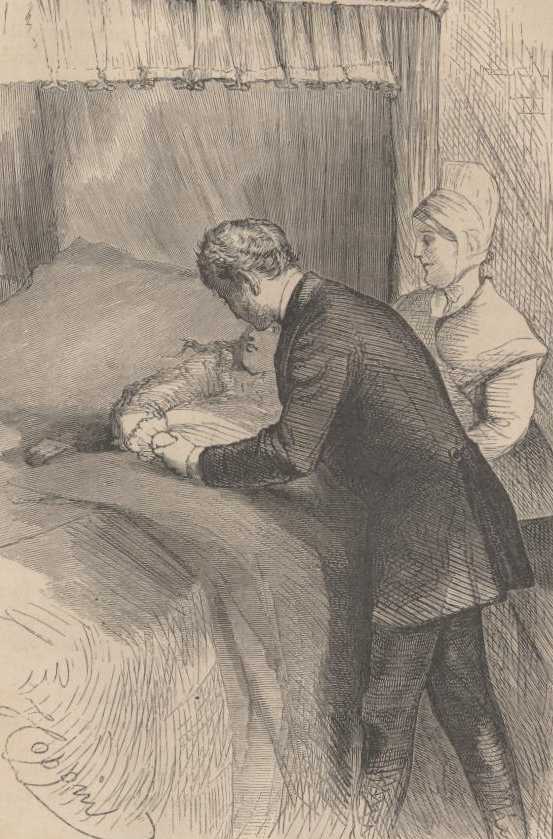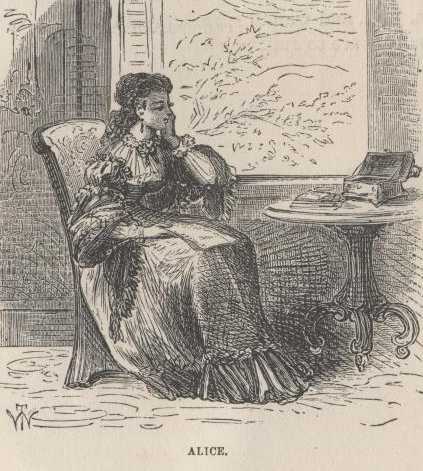'Thee is very welcome, Philip.'
'And Ruth?'
'She is very ill, but quieter than she has been, and the fever is a little abating. The most dangerous time will be when the fever leaves her. The doctor fears she will not have strength enough to rally from it. Yes, thee can see her.'
Mrs. Bolton led the way to the little chamber where Ruth lay. 'Oh,' said her mother, 'if she were only in her cool and spacious room in our old home. She says that seems like heaven.'
Mr. Bolton sat by Ruth's bedside, and he rose and silently pressed Philip's hand. The room had but one window; that was wide open to admit the air, but the air that came in was hot and lifeless. Upon the table stood a vase of flowers. Ruth's eyes were closed; her cheeks were flushed with fever, and she moved her head restlessly as if in pain.
'Ruth,' said her mother, bending over her, 'Philip is here.'
Ruth's eyes unclosed, there was a gleam of recognition in them, there was an attempt at a smile upon her face, and she tried to raise her thin hand, as Philip touched her forehead with his lips; and he heard her murmur,
'Dear Phil.'

There was nothing to be done but to watch and wait for the cruel fever to burn itself out. Dr. Longstreet told Philip that the fever had undoubtedly been contracted in the hospital, but it was not malignant, and would be little dangerous if Ruth were not so worn down with work, or if she had a less delicate constitution.
'It is only her indomitable will that has kept her up for weeks. And if that should leave her now, there will be no hope. You can do more for her now, sir, than I can?'
'How?' asked Philip eagerly.
'Your presence, more than anything else, will inspire her with the desire to live.'
When the fever turned, Ruth was in a very critical condition. For two days her life was like the fluttering of a lighted candle in the wind. Philip was constantly by her side, and she seemed to be conscious of his presence, and to cling to him, as one borne away by a swift stream clings to a stretched-out hand from the shore. If he was absent a moment her restless eyes sought something they were disappointed not to find.
Philip so yearned to bring her back to life, he willed it so strongly and passionately, that his will appeared to affect hers and she seemed slowly to draw life from his.
After two days of this struggle with the grasping enemy, it was evident to Dr. Longstreet that Ruth's will was beginning to issue its orders to her body with some force, and that strength was slowly coming back. In another day there was a decided improvement. As Philip sat holding her weak hand and watching the least sign of resolution in her face, Ruth was able to whisper,
'I so want to live, for you, Phil!'
'You will; darling, you must,' said Philip in a tone of faith and courage that carried a thrill of determination —of command—along all her nerves.
Slowly Philip drew her back to life. Slowly she came back, as one willing but well nigh helpless. It was new for Ruth to feel this dependence on another's nature, to consciously draw strength of will from the will of another. It was a new but a dear joy, to be lifted up and carried back into the happy world, which was now all aglow with the light of love; to be lifted and carried by the one she loved more than her own life.
'Sweetheart,' she said to Philip, 'I would not have cared to come back but for thy love.'
'Not for thy profession?'
'Oh, thee may be glad enough of that some day, when thy coal bed is dug out and thee and father are in the air again.'
When Ruth was able to ride she was taken into the country, for the pure air was necessary to her speedy recovery. The family went with her. Philip could not be spared from her side, and Mr. Bolton had gone up to Ilium to look into that wonderful coal mine and to make arrangements for developing it, and bringing its wealth to market. Philip had insisted on re-conveying the Ilium property to Mr. Bolton, retaining only the share originally contemplated for himself, and Mr. Bolton, therefore, once more found himself engaged in business and a person of some consequence in Third street. The mine turned out even better than was at first hoped, and would, if judiciously managed, be a fortune to them all. This also seemed to be the opinion of Mr. Bigler, who heard of it as soon as anybody, and, with the impudence of his class called upon Mr. Bolton for a little aid in a patent car-wheel he had bought an interest in. That rascal, Small, he said, had swindled him out of all he had.
Mr. Bolton told him he was very sorry, and recommended him to sue Small.
Mr. Small also came with a similar story about Mr. Bigler; and Mr. Bolton had the grace to give him like advice. And he added, 'If you and Bigler will procure the indictment of each other, you may have the satisfaction of putting each other in the penitentiary for the forgery of my acceptances.'
Bigler and Small did not quarrel however. They both attacked Mr. Bolton behind his back as a swindler, and circulated the story that he had made a fortune by failing.
In the pure air of the highlands, amid the golden glories of ripening September, Ruth rapidly came back to health. How beautiful the world is to an invalid, whose senses are all clarified, who has been so near the world of spirits that she is sensitive to the finest influences, and whose frame responds with a thrill to the subtlest ministrations of soothing nature. Mere life is a luxury, and the color of the grass, of the flowers, of the sky, the wind in the trees, the outlines of the horizon, the forms of clouds, all give a pleasure as exquisite as the sweetest music to the ear famishing for it. The world was all new and fresh to Ruth, as if it had just been created for her, and love filled it, till her heart was overflowing with happiness.
It was golden September also at Fallkill. And Alice sat by the open window in her room at home, looking out upon the meadows where the laborers were cutting the second crop of clover. The fragrance of it floated to her nostrils. Perhaps she did not mind it. She was thinking. She had just been writing to Ruth, and on the table before her was a yellow piece of paper with a faded four-leaved clover pinned on it—only a memory now. In her letter to Ruth she had poured out her heartiest blessings upon them both, with her dear love forever and forever.
'Thank God,' she said, 'they will never know'

They never would know. And the world never knows how many women there are like Alice, whose sweet but lonely lives of self-sacrifice, gentle, faithful, loving souls, bless it continually.
'She is a dear girl,' said Philip, when Ruth showed him the letter.
'Yes, Phil, and we can spare a great deal of love for her, our own lives are so full.'
APPENDIX.
Perhaps some apology to the reader is necessary in view of our failure to find Laura's father. We supposed, from the ease with which lost persons are found in novels, that it would not be difficult. But it was; indeed, it was impossible; and therefore the portions of the narrative containing the record of the search have been stricken out. Not because they were not interesting—for they were; but inasmuch as the man was not found, after all, it did not seem wise to harass and excite the reader to no purpose.
THE AUTHORS

